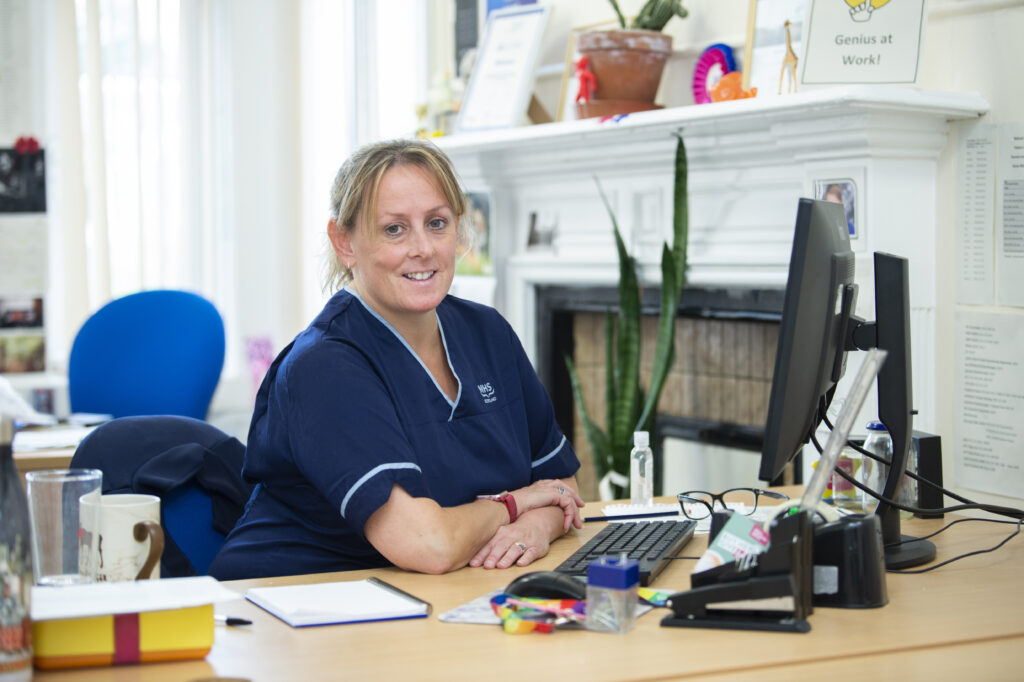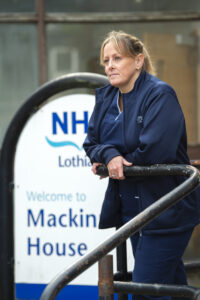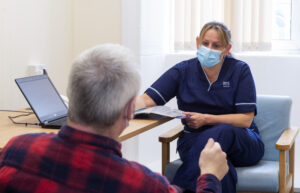Karen Ritchie
Rapid Response Team, Senior Charge Nurse
Lothian

I always wanted to be a nurse; both my parents are mental health nurses and they inspired me. When I applied, I knew I wanted to work with older people. I did my General Nursing in Dundee initially and then specialised in Mental Health in Edinburgh. My first job was based in the complex clinical care ward of a hospital. It was a challenging culture and after being there for eight years and I felt consumed by politics when I wanted to focus on patients. A role in dementia specialism came up and I applied. I wanted to meet people at the beginning of their journey. It was nice driving to see people in their own homes. You get to know people on a personal basis when you spend protracted time with them at home. Working in the community I find I have more time to reflect, plan and adapt. I was almost fully autonomous with a caseload of up to 50 people.

In my current team, we see older people in mental health crisis and our role is to help prevent them from going to the hospital. By intervening early, we hope to avoid situations where hospital care is the only option. This is a service that has been in place for younger people for a long time but we didn’t introduce it for older adults until 2016. We continue to visit after a crisis, to help build up resilience that will enable them to stay at home. Treatments and care plans are always unique and appropriate to that person – for some, it’s the confidence to walk the dog or the ability to cope with anxiety without calling someone. I hope to help people get some of their independence back. If someone does need to be admitted, we can accompany them in as a familiar face or comforting presence. My aim is to make the journey much more seamless enabling people to get the most appropriate care. Older adults sometimes struggle to work out what to say to who, they often meet nurses, doctors, home care coordinators all in one day and it’s hard to keep repeating information. I am the liaison between these other professionals. You’re meeting people in a time of crisis and communicating clearly is so important, particularly for people with dementia who often struggle with memory.

I’m proud to have this job as I set up this team and, in the process, learned about co-production, project planning and recruitment. The team has gone on to win awards and more importantly has made such an enormous difference to the lives of older people in Edinburgh. I think we’re a unique group and we all really care for one another. I still see people clinically, but my main role is to ensure the team have what they need to provide the best care possible. The ethos of care is about putting the person in the centre. We are a completely nurse-led team, and for new staff who are not used to that, it can be a little nerve-wracking. Helping to build and promote confidence within the team is a big part of my job, but we all learn from each other and that is really important.
I was very particular in the way I recruited for the team, I wanted to focus on joy and connection. This is reflected in our monthly nominations which all staff embraced completely. I have a rubber fish called Barbara the Bass, who is the inspiration for ‘Fish of the Month’. People nominate one another in the team for an action that made a difference. We read out all the nominations with lattes and biscuits and the winner gets a little gift.

I wouldn’t normally take the time or space to journal and a lot of the mindfulness stuff would normally be outside my comfort zone. The programme has given me space to develop myself as an individual. Work is no longer all-consuming, I can develop my individual skills. I know now that my team are capable without me because of how I have trained them – and when the time comes, I can step away. It was an interesting year to do the programme as the first workshop was a much-needed wellbeing bubble and then when we left COVID happened. I have struggled with the changing landscape of COVID, and I do talk to my coach and admit when I’m struggling. I was worried about not being the strength of leader that my team needed but by exposing my vulnerabilities; I now feel more powerful. I’ve even used what I have learned from the programme to help other members of my family deal with difficult situations; my brother-in-law is now journaling. Just writing things down can be life-changing. I have found a way to embrace my creativity, and this will change me forever.
I’m generally a practically minded person but I have allowed myself to be more vulnerable lately. At the beginning of the pandemic, I was writing processes and protocols, ordering cleaning stuff and just busy all the time. I broke down at the first NHS clap for carers because it felt like people were there to help get nurses through this. I made a point of journaling often and reconnecting with nature, watching tadpoles in the pond. When occupational health suggested that I work from home, I was taking calls and arranging caseload handovers. Putting my computer away and sitting in the garden helped me think through the complex logistics. It gave me space to think, reflect and plan. Working from home also made me realise that the team can cope without me. It was an eye-opener but a good one.
